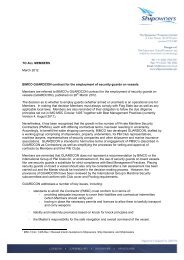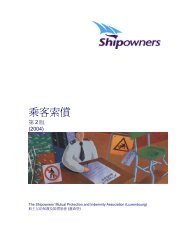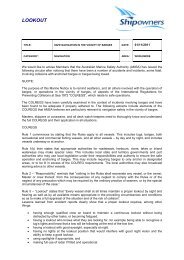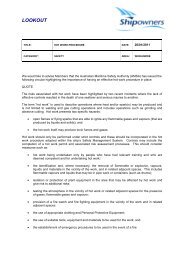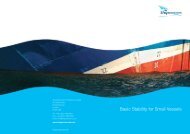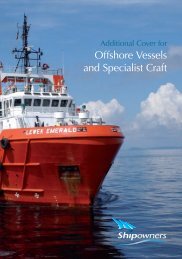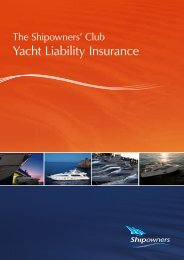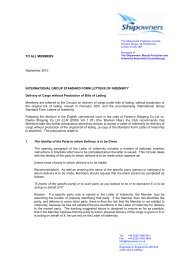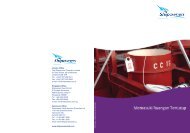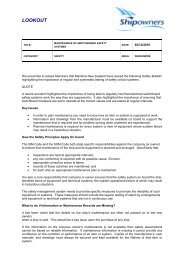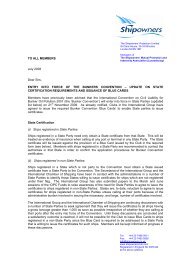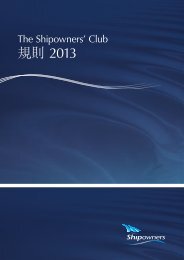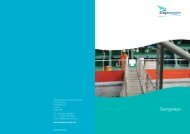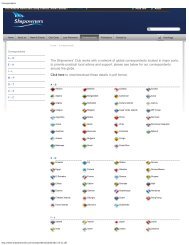Tug and Tow Claims - The Importance of P&I Cover - Shipowners
Tug and Tow Claims - The Importance of P&I Cover - Shipowners
Tug and Tow Claims - The Importance of P&I Cover - Shipowners
Create successful ePaper yourself
Turn your PDF publications into a flip-book with our unique Google optimized e-Paper software.
LOOKOUT<br />
TITLE:<br />
TUG AND TOW CLAIMS – THE IMPORTANCE OF P&I<br />
COVER<br />
DATE 16/03/2010<br />
CATEGORY: MISCELLANEOUS AREA: WORLDWIDE<br />
<strong>The</strong> following article was written by the Club for inclusion in the International <strong>Tug</strong> <strong>and</strong> Salvage<br />
magazine <strong>and</strong> is reproduced here for the benefit <strong>of</strong> all our Members.<br />
<strong>The</strong> risks faced by tug <strong>and</strong> salvage vessels are varied due to the environments they operate in,<br />
especially when operators are engaged in contracts with charterers.<br />
Each operation can present a complicated chain <strong>of</strong> liabilities either in contract or common law.<br />
Adequate cover must be put in place for liabilities arising out <strong>of</strong> pollution, collision, personal injury<br />
<strong>and</strong> damage to third party property.<br />
<strong>The</strong> <strong>Shipowners</strong>’ Club’s own experience from their 4,500 entered tugs would seem to indicate that<br />
claims from both harbour tugs <strong>and</strong> those engaged in deep sea operations are increasing in both<br />
frequency <strong>and</strong> in value. <strong>The</strong>re has been a marked increase in the number <strong>of</strong> crew claims arising<br />
from towage <strong>and</strong> property incidents.<br />
<strong>Claims</strong> arising from injury from tow lines are unfortunately common, ranging from the minor to fatal.<br />
H<strong>and</strong>ling wires in a live situation requires skill <strong>and</strong> awareness by the tug crew. In one incident a<br />
crew member suffered h<strong>and</strong> <strong>and</strong> arm injuries when placing the tow wire through a fairlead <strong>and</strong> the<br />
tug took a sheer, tensioning the wire. <strong>The</strong> resultant injury resulted in a significant claim.<br />
Loss <strong>of</strong> tow claims are <strong>of</strong>ten expensive, particularly when the tow is not recovered. A common<br />
cause <strong>of</strong> tow loss is a lack <strong>of</strong> attention by the tug’s crew in monitoring the tow. For example, a barge<br />
carrying valuable cargo sank in rough weather because a door had been left unsecured <strong>and</strong> the void<br />
spaces flooded. Even during the rough weather, the tug crew failed to properly monitor the tow, only<br />
realising what was happening when remedial action was impossible.<br />
In many cases a tow loss is the result <strong>of</strong> the tow wire parting, <strong>of</strong>ten in bad weather. If the tug can<br />
keep the tow in visual or radar ‘sight’ there is a good chance <strong>of</strong> recovery. Again, success depends to<br />
a large extent on crew awareness <strong>and</strong> equipment maintenance. Club surveys make special<br />
provision for the inspection <strong>of</strong> towing arrangements, paying attention to the tow wire <strong>and</strong> back up<br />
arrangements.<br />
Loss <strong>of</strong> control <strong>of</strong> the tow <strong>and</strong> consequent third-party damage can have a devastating result.<br />
Recently a tug lost control <strong>of</strong> its tow <strong>and</strong> the subsequent collision between the tow <strong>and</strong> a tanker at<br />
anchor resulted in a major pollution. In that incident an <strong>of</strong>ficial inquiry found that the towing wire was<br />
not fit for purpose. Several other incidents have been caused by uncertificated wires, shackles or<br />
other equipment being used inappropriately.<br />
Unfortunately, tug Masters are occasionally asked to take comm<strong>and</strong> <strong>of</strong> a tug when he is not familiar<br />
with the propulsion system. In one incident the post incident inquiry found that the tug Master was<br />
not familiar with the manoeuvring characteristics <strong>of</strong> the tug because the propulsion system in use<br />
was ‘different’ <strong>and</strong> the Master had not been properly trained.<br />
Girting a tug is as dramatic as it is sudden <strong>and</strong> the consequences can be tragic as recorded in a<br />
recent case when three crew members were lost following the capsize <strong>of</strong> a tug when manoeuvring a<br />
bulk carrier. <strong>The</strong>re are examples <strong>of</strong> girted tugs being recovered <strong>and</strong> re-entering service, but when<br />
they become a CTL or ATL the Club may be faced with an expensive wreck removal claim.<br />
Modern tug design <strong>and</strong> propulsion systems allow tugs to be used in an ‘indirect towing’ mode when<br />
escorting ships tethered or made fast. More <strong>of</strong>ten than not, records show a full girting could have
een avoided had the tugs access doors <strong>and</strong> skylights been properly closed thereby maintaining<br />
watertight integrity.<br />
Not surprisingly, claims arising from collision involving tugs are the most common category <strong>of</strong> claims<br />
against Club Members. <strong>The</strong> causes <strong>of</strong> collisions are varied. Machinery breakdowns at critical times<br />
have contributed to a tug colliding with a tow during close manoeuvres.<br />
More <strong>of</strong>ten than not, the closeness <strong>of</strong> a manoeuvre is a contributing cause. Bad weather, such as<br />
fog <strong>and</strong> strong winds, make the control <strong>of</strong> a tug very difficult notably when moving in <strong>and</strong> out <strong>of</strong> the<br />
lee created by the towed vessel.<br />
Overall, claims arising from towage incidents can be very expensive <strong>and</strong> this highlights the need to<br />
ensure that suitable contracts are in place to ensure the clear division <strong>of</strong> liabilities between the tug<br />
<strong>and</strong> tow. It is essential that the tug <strong>and</strong> tow should operate within a clearly understood contract such<br />
as the United Kingdom St<strong>and</strong>ard <strong>Tow</strong>ing Conditions, <strong>Tow</strong>con or <strong>Tow</strong>hire.<br />
<strong>The</strong> success <strong>of</strong> a tow will depend heavily on the quality <strong>and</strong> ability <strong>of</strong> the crew. A well trained crew,<br />
properly versed in safety issues, properly managed <strong>and</strong> motivated, will go a long way to ensuring a<br />
successful tow <strong>and</strong> a reduced claim record.<br />
<strong>The</strong> Loss Prevention Department has been researching claims causation in respect <strong>of</strong> the claims<br />
experienced <strong>and</strong> advising Members on how to avoid exposure to such claims. <strong>The</strong> experience<br />
gained from analysing claims can be passed on to Club Members as a meaningful tool in claims<br />
control <strong>and</strong> overall tug safety.<br />
Source <strong>of</strong> information: International <strong>Tug</strong> & Salvage



